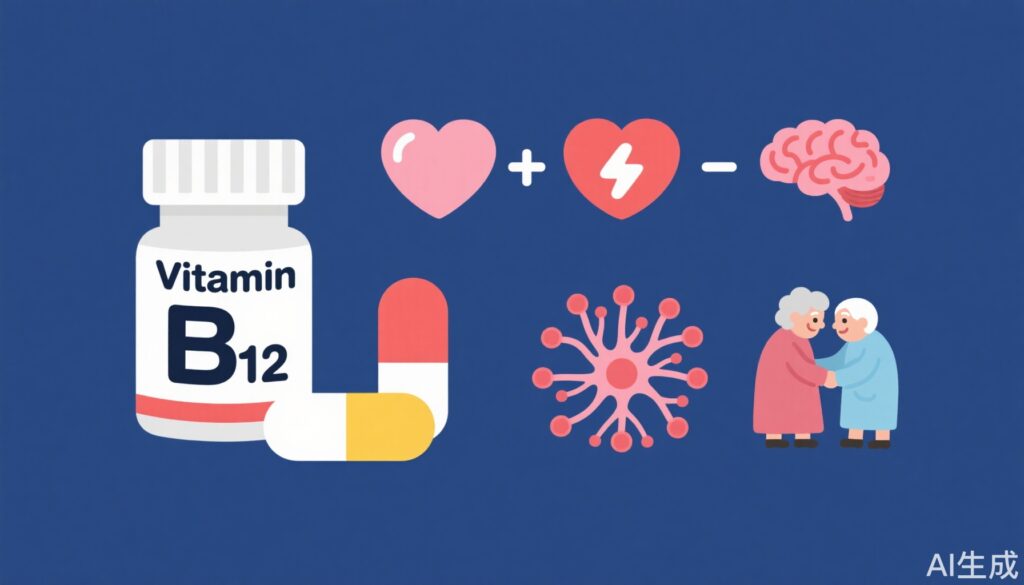Introduction: The Rising Interest in Vitamin Supplements
In recent years, public awareness about health and wellness has significantly increased. Many individuals have incorporated vitamin supplements into their daily routines to support overall well-being. Among these, vitamin B12 stands out as a popular and affordable option noted for its ability to support various health conditions.
The Importance of Vitamin B12 Supplementation
Vitamin B12 is unique among B vitamins as it contains a metal element—cobalt. According to dietary guidelines, adults are recommended to consume approximately 2.4 micrograms of vitamin B12 daily. Although this amount is small compared to other vitamins, vitamin B12 is essential for maintaining health.
A deficiency in vitamin B12 can lead to numerous health issues. These include impaired red blood cell production, causing symptoms such as dizziness, fatigue, and shortness of breath. Neurological symptoms like slowed thinking, impaired judgment, memory decline, and in severe cases, dementia, also occur. Additionally, vitamin B12 deficiency can elevate homocysteine levels, increasing the risk of cardiovascular and cerebrovascular diseases.
Older adults are particularly susceptible to vitamin B12 deficiency due to diminished gastrointestinal absorption. This is often because the stomach produces less acid and the gut microbiota balance changes with age, reducing the body’s ability to absorb vitamin B12 from food.
Certain groups should be especially mindful of their vitamin B12 intake:
- Individuals with poor gastrointestinal function: Adequate stomach acid and healthy gut bacteria are necessary for vitamin B12 absorption.
- Chronic heavy drinkers: Alcohol adversely affects overall health and impairs vitamin B12 absorption.
- People on specific medications: Drugs that reduce stomach acid secretion or medications like metformin for diabetes can interfere with vitamin B12 absorption.
- Those with autoimmune diseases: Conditions such as lupus or Graves’ disease can impair vitamin B12 absorption, worsening the disease state and creating a vicious cycle.
Vitamin B12 vs. Methylcobalamin: Understanding the Differences
It is important to distinguish between vitamin B12 and methylcobalamin, as they are not exactly the same.
Vitamin B12 refers broadly to several forms, including cyanocobalamin, hydroxocobalamin, adenosylcobalamin, and methylcobalamin. Commonly, when people mention vitamin B12 supplements, they are referring to cyanocobalamin. After oral intake, cyanocobalamin is absorbed in the small intestine and converted within cells into the active forms methylcobalamin and adenosylcobalamin, which participate in vital biochemical processes.
Therapeutically, these forms differ slightly in use. Vitamin B12 injections are often used to treat conditions like subacute combined degeneration of the spinal cord and pernicious anemia caused by intrinsic factor deficiency. Methylcobalamin injections and tablets are preferred for peripheral neuropathies and megaloblastic anemia caused by vitamin B12 deficiency.
Methylcobalamin is more readily incorporated into nerve cells, promoting nucleic acid and protein synthesis, making it particularly recommended for peripheral nerve disorders. For treating megaloblastic anemia, both cyanocobalamin and methylcobalamin are equally effective and can be used interchangeably.
Vitamin B12 Supplementation: Potential Improvements in Four Major Health Issues in the Elderly
Elderly individuals especially benefit from monitoring and supplementing vitamin B12 to reduce the risk of various health conditions.
1. Reducing Cardiovascular Disease Risk
Elevated homocysteine levels damage blood vessel linings and increase the risk of blood clots, contributing directly to cardiovascular and cerebrovascular diseases. Vitamin B12 supplementation helps lower homocysteine, thus potentially reducing heart and brain vascular disease risk.
2. Lowering Dementia Risk
Vitamin B12 is critical for brain function. Deficiency can cause cognitive decline and increase the risk of dementia. Elevated homocysteine, linked to vitamin B12 deficiency, is a known risk factor for Alzheimer’s disease and other dementias.
3. Preventing Nerve Damage
Vitamin B12 is involved in the synthesis and repair of myelin, the protective sheath around nerve fibers essential for proper nerve signal transmission. Deficiency can damage the myelin sheath, leading to neuropathy symptoms such as numbness, tingling, and abnormal sensations.
4. Alleviating Fatigue and Regulating Mood
Vitamin B12 supports cellular energy metabolism. Deficiency impairs nutrient utilization from food, causing persistent fatigue. Additionally, vitamin B12 influences the synthesis of neurotransmitters like serotonin and dopamine, which regulate mood. Deficiency can contribute to depression and low mood.
Dietary Sources and Supplementation Guidance
Adults can generally meet their daily vitamin B12 needs by consuming foods rich in this vitamin, including lean meats, dairy products, and shellfish.
Individuals with impaired gastrointestinal function may require supplemental vitamin B12 to achieve adequate levels. It is essential to follow medical advice regarding supplementation dosage, as excessive intake can lead to complications such as hypokalemia, eczema, and asthma exacerbations.
Conclusion: The Essential Role of Vitamin B12 in Health
Vitamin B12 plays a vital role in maintaining multiple aspects of health, particularly for the elderly. Monitoring vitamin B12 levels and timely supplementation upon deficiency detection can prevent serious health issues. Proactive management is important to avoid waiting until symptoms develop to intervene.



